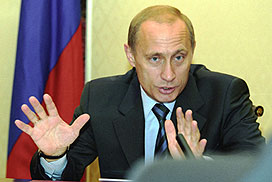Putin visits Czech Republic
Russian President Vladimir Putin was to visit the Czech Republic on Wednesday, part of a swing through central Europe that underscores his hopes of boosting Moscow 's economic connections and clout in nations that once chafed under its control. In the first visit by a Russian president in 13 years, Putin and his hosts are likely to set a brisk, businesslike tone in relations long poisoned by the Communist past.

"We have managed to overcome a certain stagnation from the 1990s," Czech Deputy Foreign Minister Jaroslav Basta said in a newspaper interview ahead of the visit. Both Putin and Czech President Vaclav Klaus have stressed the need to look to the future. Putin is seeking new ways to tighten ties with ex-Warsaw Pact nations that are now in NATO and the European Union, while Klaus has pitched his country as a bridge between East and West.
Putin aide Sergei Prikhodko said trade and economic ties would dominate the talks in Prague , the ITAR-Tass news agency reported. Natural gas will be a major issue and that both sides are expected to stress the need to diversify delivery routes for Russian gas to Europe , he said.
The Czech Republic relies on Russia for some 75 percent of its gas, but Czech officials said deliveries were not significantly affected when Moscow cut off gas supplies to Ukraine during a price dispute in early January, which resulted in a decrease in deliveries to several European countries and raised questions about Russia' reliability.
Putin's visit may be punctuated by reminders of decades of bad blood between Russia and the Czech Republic, where anger at Moscow's postwar domination deepened when Soviet-led forces crushed the "Prague Spring" reforms in 1968 and was reflected by the country's swift shift Westward when communism collapsed.
The invasion left a legacy of mistrust of Moscow , but Putin and Klaus appear determined to emphasize unity. In Hungary on Tuesday, Putin acknowledged Moscow 's moral responsibility for the brutal Soviet suppression of the 1956 uprising there, but said today's Russia is not the Soviet Union and that nations should focus on the future.
Klaus made similar comments in an interview with a Russian newspaper that was posted on his Web site Tuesday, calling the 1968 invasion a "deep wound" that cannot be forgotten but saying it should not affect ties with Russia today. "For me, the Russian Federation of today is not the heir or successor of Brezhnev's Soviet Union ," he said.
In a protest targeting both Russia 's past and present, Czech lawmaker Jaromir Stetina has vowed to walk out of the upper parliament house if Putin enters it Thursday, when he is to meet with the chairmen of the parliament chambers, though those meetings are expected to be held in a different building. Stetina pointed to Putin's KGB background and accused him of responsibility for Russia 's heavy-handed policies in Chechnya and the stifling of democracy and freedom of speech, reports the AP.
N.U.
Subscribe to Pravda.Ru Telegram channel, Facebook, RSS!


